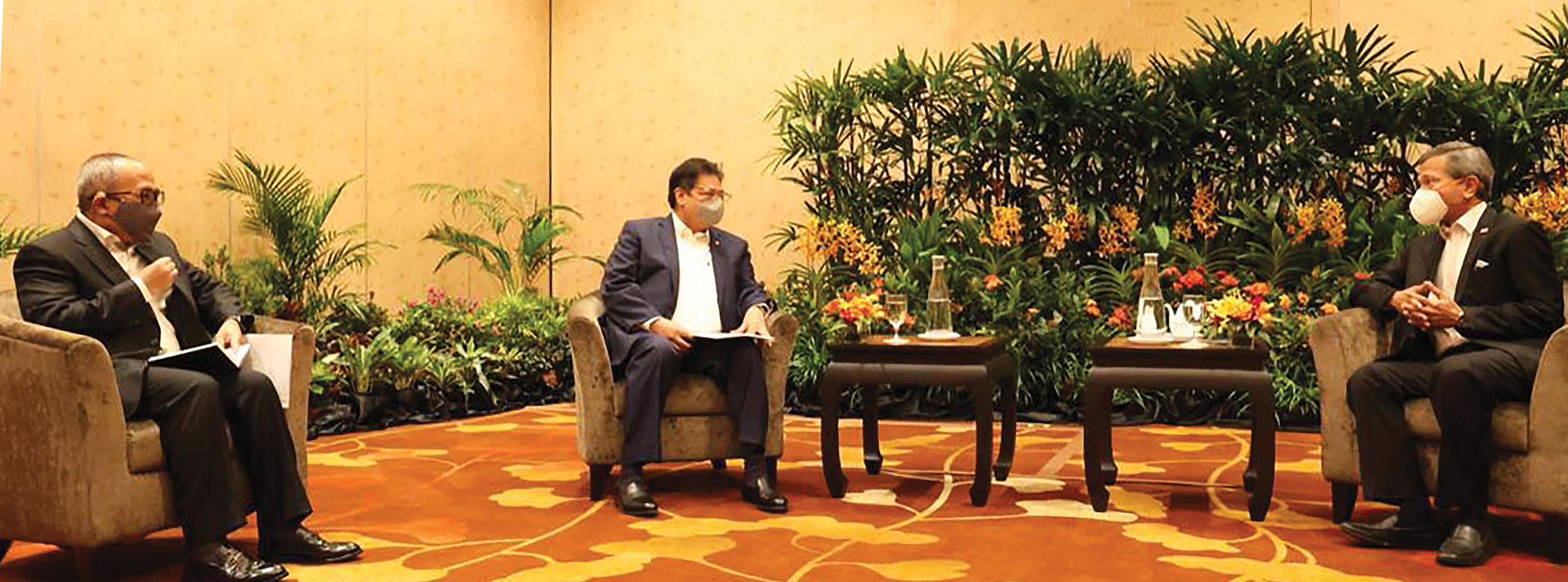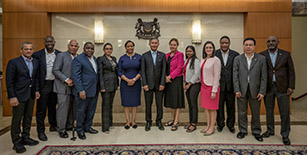
Indonesian Coordinating Minister Airlangga Hartarto (middle) on a working visit to Singapore in July with Indonesia’s Ambassador to Singapore Suryo Pratomo (far left) and Singapore Foreign Minister Dr Vivian Balakrishnan
By Mr Airlangga Hartarto, Indonesia’s Coordinating Minister for Economic Affairs
SINCE its outbreak in 2019, COVID-19 pandemic has impacted the lives of people all over the world, including in Indonesia. It has unpended global and Indonesia’s economy. Although 2020 was the toughest year for Indonesia, we are optimistic that it can bounce back from this very challenging situation. Indonesia’s economic growth in the first quarter of this year, contracted by 0.74 percent, showing improvement from the last quarter of 2020’s figure which contracted by 2.19 percent (year on year).
Recently, the number of confirmed COVID-19 positive cases in Indonesia rose sharply due to the fast-spreading Delta variant across the country. To prevent another spike, the Indonesian Government continues to make efforts to handle COVID-19 cases in Indonesia.
Believing that vaccination has a central role in handling COVID-19 and recovering the national economy, the government is now racing to roll out national vaccination programs targeted to reach herd immunity immediately. At the same time, the government also continues to boost 3T (Tracing, Testing, Treatment) followed by urging people to have the discipline of wearing masks which is the key to preventing the spread of COVID-19. In addition, complying with other health protocols such as maintaining distance, avoiding crowds and washing hands are also very necessary for health to recover and the economy to rise.
“Health and economic aspects must go hand in hand in efforts to handle the COVID-19 pandemic. The Government is working hard to revive all components of the economy while still prioritizing the health side.”
To curtail the spread of COVID-19 cases from getting even greater, considering that the Delta variant is a variant of COVID-19 that is very easily transmitted, the Government implements Community Activity Restrictions (PPKM) which is also applied periodically, especially in red zone areas with a high number of COVID-19 cases. The PPKM restriction is targeted to decrease confirmed cases by below 10,000 cases per day.
On the other hand, the Government also focuses on maintaining the momentum of economic recovery by accelerating the National Economic Recovery (PEN) program, in health, social protection, priority programs, business support packages for MSME and Corporate, with a total ceiling of Rp 699.43 trillion. As of July 16, 2021, the PEN program has been realized by 39.7 percent.
 “Discipline of wearing masks is the key to preventing the spread of Covid-19. In addition, complying with other health protocols such as maintaining distance, avoiding crowds and washing hands are also very necessary for health to recover and the economy to rise.”
“Discipline of wearing masks is the key to preventing the spread of Covid-19. In addition, complying with other health protocols such as maintaining distance, avoiding crowds and washing hands are also very necessary for health to recover and the economy to rise.”
Health
The health program focuses on diagnostic testing and case tracing, costs and accommodation for treating COVID-19 patients, as well as other health care programs including the implementation of the Vaccination Program. Currently, Indonesia’s COVID-19 vaccination rollout has touched around 45 million people. On average, the Government has injected 900 thousand vaccinations every day in the period from June 26 to July 3, 2021. The government seeks to vaccinate 208 million residents.
In accelerating the COVID-19 vaccination program, the government has been working closely with multiple stakeholders, including those in the private sector. On the other hand, the Government is also working with state-owned pharmaceutical company, Biofarma, to develop an Indonesian-made vaccine, named “Red and White Vaccine”.
Social Protection
The social protection program is targeted at assisting economically vulnerable communities. The Central Government cooperates with the Regional Government to provide this assistance as a strategy for economic recovery and improving people’s welfare during the pandemic. This assistance is implemented through various programs, namely: Family Hope Program (PKH), Basic Food Cards, Electricity Discounts, Cash Social Assistance, Village BLT, Internet Quota Subsidies for Participants and Students, Pre-Employment Cards and Wage Subsidy Assistance, and Rice Assistance.
Business Support Packages
To support the overall economic recovery, the Government also provides assistance and incentives for business activities, MSMEs and corporations. Under the business incentive program, the Government provides support in the form of extension of tax incentives through PMK 9/2021, and other tax incentives such as PPnBM DTP Motor Vehicles, PPN DTP Housing, Exemption of PPh 22 Imports, Reduction of Installment PPh 25, Decrease in Corporate Income Tax Rates, Final PPH DTP P3TGAI, as well as relaxation and restructuring of credit for banks, and Credit Guarantee PMK-32/2021.
Meanwhile, supports provided to the MSME and Corporate clusters include interest subsidies for MSME, support for the HOREKA sector, MSME and Corporate IJP subsidies, Rekmin Exemption, Expenses and Abodement Fees, PMN BUMN, LPEI, and LPI, Placement of Banking Credit Restructuring Funds (Debtors) and other supports aimed at assisting MSMEs and Corporations affected by the pandemic in running their activities.
In addition to these programs, the Government also carries out various main Priority Programs to improve community welfare and create job opportunities. The implementation of the Ministry/Agency’s labor-intensive program is implemented in collaboration with the Regional Government in order to create job opportunities for affected communities.
Support for Industrial Estates, Creative Economy and National Tourism Strategic Areas is also provided to help create job opportunities and improve the surrounding community. The Food Estate and Irrigation Program is implemented to improve food security.
Meanwhile, the implementation of the National Strategic Projects will also continue to be carried out during the Pandemic period to create jobs and support infrastructure readiness in Indonesia. In addition, several other priority programs are also being carried out such as regional loan facilities, ICT support and so on.
To attract investment, create new jobs, and stimulate the economy, the Government of Indonesia has enacted Law No. 11 of 2020 concerning Job Creation, also known as “Omnibus Law on Job Creation”. The Law stipulates substances related to, among others, improving the investment ecosystem and business activities; employment; ease, protection and empowerment of cooperatives and SMEs; and ease of doing business. Following the enactment of the Omnibus Law, the Indonesian Government enacted 49 implementing regulations to the Omnibus Law. These consist of 45 Government Regulations and four Presidential Regulations.
The implementation of the Job Creation Law is particularly aimed at encouraging job creation and entrepreneurship through the ease of doing business on a micro to large scale, protecting workers’ rights through worker protection, and providing benefits to the general public including for housing provision and land redistribution.
Indonesia is confident that through the Omnibus Law and its implementing regulations, along with other efforts taken by the Government, it will be able to speedy-recover its economy, increase its competitiveness and become a far more attractive destination for potential foreign businesses and investors.

 “Discipline of wearing masks is the key to preventing the spread of Covid-19. In addition, complying with other health protocols such as maintaining distance, avoiding crowds and washing hands are also very necessary for health to recover and the economy to rise.”
“Discipline of wearing masks is the key to preventing the spread of Covid-19. In addition, complying with other health protocols such as maintaining distance, avoiding crowds and washing hands are also very necessary for health to recover and the economy to rise.”




